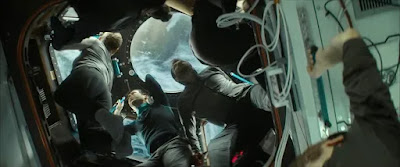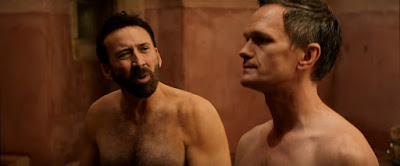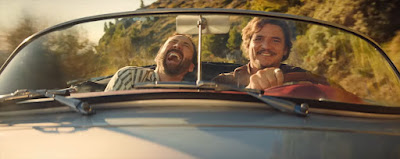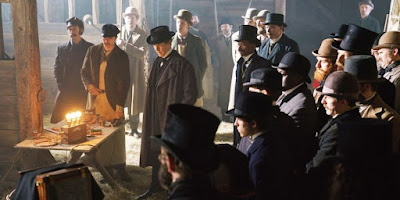or
Chekhov's Environmental Control SystemI.S.S., of course, stands for International Space Station, that dragonfly-like polyglot of modules—Soviet and American—that were first launched into space in 1998 for construction and was first occupied by people in November 2000. It has been circling up there for 24 years, perpetually crewed—273 individuals from 21 countries—performing observations and doing micro-gravity experiments in "astrobiology, astronomy, physical sciences, materials science, space weather, meteorology, and human research, including space medicine and the life sciences" (according to its Wikipedia page). The darned thing even has a blog. Several documentaries and one fictional film have even been shot in it (I'm sure it's streaming "somewhere"). Five space agencies are involved: Russian, American, Japanese, European, and Canadian all getting along just fine circling the Earth perpetually, quite separate from life on Earth, which has struggled to survive with changing global conditions, wars—civil and not, famine, disease (at times reaching global pandemic levels), changes of governments and coastlines, earthquakes, volcanoes, and an increasing experimenting with autocracy and xenophobia, despite the fact that everyone came from somewhere and migration has been going on for a very long time. Space may be a hostile environment, but it seems positively utopian next to the pale blue dot its circling.The new movie by Gabriela Cowperthwaite, I.S.S., tries to be as many things as the station, itself. A thriller (paranoid variety), a bottle movie, a "what if?" scenario, a cautionary tale, and a sociological statement of sorts. It pretty much "screws the pooch" (as the astronauts say) on every level, although it does try hard. But, "trying hard" usually just means your booster's going to explode on the pad.It's the first time up in space for former Marine and NASA astronaut Dr. Kira Foster (Ariana DeBose—I like her), who is traveling to the ISS for an extended time and she's being counseled by her pilot Christian Campbell (John Gallagher Jr.)—because evidently they don't have training anymore for astronauts. The trip is quick in movie-terms—she gets launched and, all of a sudden, the station is out the window. She advises that the Russians traditionally knock three times before opening the hatch, and this is the one instance where the information they give you doesn't telegraph something's going to happen later in the movie, because they never do it again.
She meets the astro- and cosmo-nauts already there: Commander Gordon Barrett (Chris Messina), Weronika Vetrov (Masha Mashkova), Nicholai Pulov (Costa Ronin), and Alexey Pulov (Pilou Asbæk). Everybody gets along perfectly fine; Barrett and Vetrov, more than fine, as it's floating around that they're sharing equipment (wink, wink). The veterans show Dr. Foster the ropes—and, apparently, the wires that make everything look like they're in a micro-gravity environment. If one is being charitable, one could say that everybody tries very hard to create the illusion, gently swaying as if they're on a boat in gently-choppy waves, but once one gets used to the fact that everybody looks like there's gravity weighing them down, you just go with it, because there are other issues on board that command greater attention.Like learning where "the cupola" is. That's the part of the station that provides a lovely panoramic view of the Earth (and is, apparently one of the most popular places on the real space station). Oh, and did anybody mention the station has an "altitude problem" where the station is getting low enough in orbit that the atmospheric drag will start decaying their trajectory around the Earth enough that the whole thing is going to start flaming back down to Earth. Somebody should look into that. Oh, well...let's wait to hear from the ground about it before we do something.* It's a long mission...what's your hurry?
The answer comes soon enough. Foster is Earth-gazing one day and sees a flash just off the Yucatan peninsula. Then, another. Then, more. The flashes starting to spread. "Hey guys? Could you come here please?" she yells back to the crew. They look in horror as the flashes start to spread...and there's no explanation from Earth. All contact with Mission Control, Russian or American, has gone dead.**Well, that ain't good. The Russian and American teams hover over their radios sending out hails, but nothing's coming back (Hey, I've got an idea...how about firing your boosters and pushing yourselves higher in orbit, so you don't go crashing and burning back down to Earth...ya know, just to give yourselves something to do to pass the time....yeah, no, they don't do that.) Both crews speculate idly, wonder what could happen, and stop talking to each other. Because if their communications systems are dead, why not stop talking at all? Things and people get suspicious and just a little paranoid while awaiting word from Mother Earth.And, of course, things don't get better. What they get from Mission Control is short and terse: "An act of war has occurred between U.S. and Soviet militaries. All Americans abort all orders and experiments. Priority is to take over I.S.S...by any means necessary." And the Soviets are behaving oddly. They have a problem with their communications antenna—frankly, at that point, who doesn't—and it will require a space-walk to fix it. Barrett volunteers. Nobody else does. But, he decides to go anyway. "Massive lack of protocol," Foster tells him. But, he goes, anyway.By this point, I had given up. I went to see I.S.S. because I'm a space-nerd. And, it's an interesting premise—what if you're in space and everything goes to shit back on Earth? George Clooney made an interesting, haunting version of this with The Midnight Sky. But, I.S.S. has no such ambitions. It's a ship of recycled parts—The Thing (but without "The Thing"), Alien (but without the Alien), and Solaris for the psychological elements of the paranoia, isolation, and conflict that close quarters can produce in humans. But, that's about it. It's an interesting premise—what do you do when you're the survivors of a war but your continued survival is limited? It's the space-age version of a refugee situation. Do you start fresh, or retain your memories and your grudges and try to regain the past? Interesting questions.None of which are even approached by I.S.S. It takes the stupid route—let the actions be decided by the blindly militant or the short-sighted paranoids. War breaks out on the space station and any negotiation is disrupted by one of those two types. One might as well be back on Earth if they're going to take that route. There's no forward thinking (as one expects in speculative fiction) only the backwards thinking that produces wars in the first place. Thanks, but I can see that at home.Still, there were a couple of moments that provoked something approaching interest. At one point, during his space-walk, the commander unbuckles his life-line because he can't reach his next hand-hold and I audibly sneered "you idiot!" (it's okay, I was the only one in the theater), knowing full well that any script that would have something that stupid happen would follow it up with said idiot being bumped off the station. No spoiler alert necessary; the whole movie is a spoiler alert.But, this is how bad it got, and how low the bar became. At some later point, there is some tension about a knife in the kitchen. And the paranoid character slams the knife petulantly onto the kitchen table-top. Where it LAYS there (in micro-gravity, remember). It doesn't float. It lays there. And I gave the movie-props (what little I could) for not giving us an insert shot displaying some label like "MAGNO-KNIFE©" to explain why it's not floating around in zero-g. That's doing some complicated mental charity that the movie doesn't deserve, but at that point I was desperate to come up with anything good to think about the thing.
It's that bad.
They won't be showing I.S.S. on "movie night" aboard the real I.S.S.
Evidently, things get a bit sullen when the Russians are "the bad guys" in the movies.
(Actually, given the quality of I.S.S., they should consider themselves lucky)
* Um. To put it simply...why? Why wait? The booster rockets they need to get them higher in orbit...are ON THE SPACE STATION. They can't do it themselves? Sure, it's always best to check with Mom and Dad back on Earth, but...if it's an issue, why not DO something about it? "He who hesitates" and all that.
** I've talked about the micro-g simulation attempts, but how are the other special effects? Depending on the shot—and there are several crews involved—they can be quite lovely, or Marooned-level terrible. It was actually surprising the discrepancies from shot to shot. The budget, by the way, was comparatively miniscule—$13.8 million (which is about what Star Wars cost in 1977). Godzilla Minus One has a budget just below $15 million.




















































